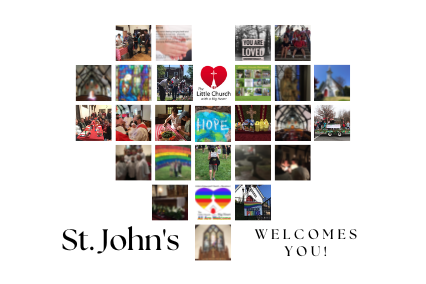|
ANNOUNCEMENTS - The Week of June 16, 2024 (click here for the PDF version)
Here’s what’s happening at St. John’s, around the diocese, and in the local community. MOVING FORWARD Today is Rev. Sharon’s last Sunday as priest-in-residence at St. John’s. Deacon John will continue to officiate at morning prayer services each month, and the vestry is arranging for supply clergy to celebrate Eucharist on some Sundays. St. John’s also is seeking volunteers who can help with worship, including those who may wish to be trained by the diocese as lay worship leaders or preachers. Contact wardens Sharon Liparini and Debbie Henschel if you are interested. And reach out to them, Deacon John, or vestry members (Kathy Cascone, Fran Maenza, Joan Magrane, Michelle Riegel, Sandra Lee Schubert, Carl Sparano and Janice Schouten) with any questions, concerns, ideas or other parish business. Please contact Kathy Cascone with pastoral-care concerns. PRAYER LIST Let Kathy Cascone (casconek(at)yahoo.com or 973-219-1007) know if you wish to add anyone to the parish prayer list, or if a name is ready to be removed. COMMUNICATION Staying well-informed is important, especially during transitional times. Here are some ways to learn what’s happening and stay involved:
0 Comments
Dear St. John's,
I am eager to return to celebrate Holy Eucharist with you this Sunday. I had hoped to return from my medical leave in time for Pentecost, but, as the Robert Burn poem says, “The best laid schemes o’ mice an’ men gang aft agley”! As humans, we move through time chronologically, planning for what will happen in the next moment and hour and day and year. But often, the future forces changes to those plans. When this happens, it’s helpful to remember that God is with us every moment – and that each individual moment is the only time we truly have. While it is good to plan ahead, there is no guarantee we will live to see the future we have planned for. So, let us not get so caught up in dwelling on the past or dreaming of the future that we forget to live in the present. Let us not miss the beauty of the iris or the flicker of summer’s first firefly or the love in a dear friend’s smile. “This is the day that the Lord has made. Let us rejoice and be glad in it.” (Psalm 118:24-25) Rev. Sharon Dear St. John’s,
I suspect none of us expected this morning’s earthquake. When such an unusual event occurs, we often look first to more ordinary explanations. I initially thought a tree fell on my house. Other friends at first attributed the rumbling to a passing truck, a car hitting the foundation of their building, an airplane crashing near Newark Airport and even to their washing machine. It’s like the Resurrection. No one expected Jesus to rise from the dead. So those who first saw the empty tomb assumed someone had stolen his body. Those who first encountered him didn’t recognize him at first. They thought he was a gardener or a fellow traveler on the road to Emmaus. And even though the miraculous event was the same, each person experienced and understood and interpreted it from their own location and perspective. So the Bible contains different accounts of the Resurrection. And we, too, experience the Risen Christ in different ways – often when we’re least expecting it. We, too, share our stories of when we have seen the Lord in our lives. Each story may be as unique as our fingerprints, because Jesus meets each of us where we are. But they all share the amazing, eternal truth on which our faith is based: Christ is risen! The Lord is risen indeed! Alleluia! Rev. Sharon Dear St. John's,
This Sunday, we are excited to welcome Bishop Carlye Hughes to St. John's. She will lead the worship service and join us for a short time at coffee hour, then meet with the vestry, wardens and clergy. This will be a time to celebrate St. John's and also to assess where we are and dream about the future. So that we all are well-informed, in case any of you missed the annual meeting last Sunday, I'm printing a copy of my message below and attaching a copy of the annual report. I hope you are all able to join us for this special Sunday. Rev. Sharon Annual report message: The past year was a busy one for St. John’s. We worshiped together every Sunday, undeterred by the occasional balky boiler, fallen plaster or winter storm. We buried beloved parishioners and baptized babies into our membership. We introduced a Longest Night service and revived the tradition of celebrating Palm Sunday with the First Presbyterian Church by eating breakfast together and processing with blessed palms between our churches. Among our many other activities:
Because of these ongoing financial pressures, I will conclude my time as priest-in-residence at St. John’s at the end of my two-year letter of agreement in June. During my remaining time here, I am working with the vestry to arrange training for those interested in assisting with worship. This includes members to lead Morning Prayer and to serve as readers of sermons as well as lessons. Periodic supply clergy will provide Communion each month. I also will be preparing bulletin templates to assist with future worship planning. On the financial side, the vestry is working hard to cut expenses and prioritize needed capital improvements. Among other things, it is exploring options for renting or eventually selling the rectory after the Ibrahimis move and looking for new fundraisers. I am sad to leave this church community I have come to love. Members may be feeling anxious about entering a time of clergy transition and about making decisions about St. John’s future. Change and transition can be hard for all of us. But the COVID shutdown reminded us that, at its heart, the church is its people. St. John’s members are a faithful, loving church family. And we have Jesus’ promise that he will always be with us. So let us move forward in prayer with confidence as we prepare for and discern the future together. For, as one of my favorite hymns proclaims: God has work for us to do. Rev. Sharon Almighty and everliving God, source of all wisdom and understanding, be present with those who take counsel at St. John’s for the renewal and mission of your Church. Teach us in all things to seek first your honor and glory. Guide us to perceive what is right, and grant us both the courage to pursue it and the grace to accomplish it; through Jesus Christ our Lord. Amen.
Dear St. John’s, This Sunday, we will gather in the parish hall after the 10:30 a.m. worship service for a special coffee hour and our annual meeting. We will hear updates on our church’s finances and ministries, and, in light of those reports, we will be discussing St. John’s future. We also will elect members to the vestry and other offices. I strongly urge everyone to attend. We want everyone to be informed, and we want everyone’s thoughts and ideas to be heard. If you cannot attend, or only follow us online, please keep St. John’s in your prayers as we discern what God is calling us to do in the days ahead. Rev. Sharon Dear St. John’s,
Have you ever wondered why we’re called the Episcopal Church? “Episcopal” refers to bishops, one of the three ordained ministries in the church (the others being priests and deacons). The glossary of terms on the denominational website (https://www.episcopalchurch.org/glossary/) explains that “bishops serve as chief pastors of the church, exercising a ministry of oversight and supervision. Diocesan bishops hold jurisdiction in their dioceses, with particular responsibility for the doctrine, discipline and worship of the church. Bishops serve as the focus for diocesan unity and for the unity of their dioceses with the wider church. Since the bishop's ministry is a ministry of oversight, the term ‘episcopal’ (derived from the Greek episcopos, ‘overseer’) is applied to matters pertaining to bishops. An ‘episcopal’ church is a church governed by bishops, and ‘episcopal’ services are led by bishops.” Diocesan bishops oversee the geographic areas called dioceses in our church. St. John’s belongs to the Diocese of Newark, which encompasses the northern half of New Jersey and is led Bishop Carlye Hughes. Such bishops are required to visit every parish in the diocese at least once every three years. Bishop Hughes will visit us on March 17, where she will celebrate and preach at the 10:30 a.m. Eucharist, greet the congregation at coffee hour, and then meet with the vestry and clergy. To learn more about what’s happening in our diocese and the work of our bishop and the diocesan staff, I encourage you to explore the diocesan website (https://dioceseofnewark.org), read our diocesan newsletters (https://dioceseofnewark.org/e-news) and to listen to (or read) the bishop’s vlog posts (https://dioceseofnewark.org/bishops-vlog). On the website, you also can sign up to receive the every-other-week newsletters and other announcements via email. I hope you all will mark the date on your calendar and join me in welcoming our bishop in a few weeks! Rev. Sharon Dear St. John’s,
I saw a Facebook “meme” this morning where one person asks, “What are you doing on Valentine’s Day?” “Rubbing dirt on people’s faces and telling them they’re going to die,” the other replies. The post pokes fun at the fact that this year Ash Wednesday, when we repent our sins and contemplate our mortality, falls on Valentine’s Day, when we celebrate love. Ash Wednesday is a somber moment as we begin the season of Lent. The 40 days of Lent are a time for self-examination and repentance. We may fast – whether physically giving up things like alcohol or smoking or meat on Fridays or food entirely on certain days, or from things such as criticizing others or gossiping or participating in certain social media. We may commit to additional prayer time or Bible study or take on a new ministry or volunteer opportunity. It’s a serious time, but that doesn’t mean we’re required to be miserable or berate ourselves for our shortcomings. Our actions should seek to enhance our self-awareness and our relationship with God. And they can be enjoyable! For example, at St. John’s, we’ll host a one-hour Zoom prayer service and discussion each Friday night. Our neighboring Episcopal churches in Mountain Lakes and Denville are hosting a Wednesday night study of a brief book on the Lord’s Prayer to which all are invited. For an entertaining and education March Madness-style event about the Episcopal Church’s saints, check out Lent Madness at lentmadness.org. I hope programs such as these can help you enter into a Holy Lent. We will begin our Lenten journey at St. John’s with a Eucharist and imposition of ashes on Wednesday, Feb. 14, at 8 p.m. Rev. Sharon Dear St. John’s,
“Tikkun Olam” is a Hebrew phrase that means healing or repairing the world. According to an article by scholar Jonathan Krasner, “Many American Jews consider it a cornerstone of their Jewish identity, a key reason they’re committed to making the world a better place.” As Christians, we also are called to be world healers. God called us in Genesis to be good stewards of Creation. And the Church’s mission, as described in the catechism in the back of our prayer book, is “to restore all people to unity with God and with each other in Christ.” This work of repair and restoration could take many forms: praying for others; performing acts of kindness and mercy; taking steps to help achieve justice and peace among all people, as we promise in the baptismal covenant; picking up trash or recycling our waste or planting a garden; engaging with others we disagree with in respectful dialogue. What can we each do this week as part of Tikkun Olam? Rev. Sharon Dear St. John’s,
Lately, the church calendar has been filled with stories of call and conversion. In last week’s Gospel, Philip and Nathanael become Jesus’ disciples. Yesterday marked what is called the Confession of Saint Peter, when the disciple Peter proclaims that Jesus is the Messiah, the Son of the living God. This Sunday, we will hear about Jesus’ invitation to fishermen Simon (Peter) and Andrew to follow him and become “fishers of people.” And Thursday will celebrate the conversion of St. Paul on the road to Damascus. Jesus calls each of us to follow him. As happened with those early disciples, we each experience that call differently. This Sunday, we will resume Bible study with a look at some of these biblical stories of call and talk about the disciples’ experiences and our own. How did we come to believe in Jesus? How is God calling us today? I hope you will join us for this discussion. We’ll worship as usual at 10:30 a.m., when we will welcome three new young members through baptism. Then we’ll gather for coffee hour and begin Bible study about 11:45. I’m anxious to hear your stories! Rev. Sharon Dear St. John’s,
Today is the 12th day of Christmas (cue the drummers drumming), which means that tomorrow is Epiphany or Three Kings Day. This is when we celebrate the arrival of wise men who followed a star to Bethlehem to see Jesus, “the child who has been born king of the Jews” (Matthew 2:2). An “epiphany” is a manifestation – in this case, the first manifestation of Christ to the gentiles, or non-Jews. The season of Epiphany is filled with signs or manifestations of Jesus’ true nature, from his baptism, when a voice from heaven declares, “You are my Son, the Beloved; with you I am well pleased” (Mark 1:11), to Jesus’ first recorded miracle turning water into wine to his mountaintop transfiguration. One fun tradition is to write a special Epiphany blessing on doorways. The blessing changes each year and follows a formula. This year, it is 20+C+M+B+24. The letters come from the traditional names for the wise men: Caspar, Melchior and Balthazar. They also are an abbreviation for “Christus Mansionem Benedicat,” which means “May Christ bless this dwelling.” So, consider taking a piece of chalk and creating a little “holy graffiti” at your house. Here’s a link to an article with more details about this ancient practice. https://www.episcopalnewsservice.org/.../for-an-epiphany.../ Rev. Sharon P.S. – We’re keeping a close eye on the weather reports. The current plan is to hold church in person on Sunday for those who can safely make it. But if you are worried about travel conditions, please err on the side of safety and stay at home. There are plenty of worship opportunities available online! If we feel we must cancel in-person worship for safety reasons, we will send out an email by 9 a.m. on Sunday and include a Zoom link so you can join me for worship led from my home. |
AuthorSArticles are posted by the Communication team, Rev. Sharon and others. Archives
June 2024
Categories
All
|
|
St. John's Church
226 Cornelia Street Boonton, NJ 07005 |

 RSS Feed
RSS Feed


